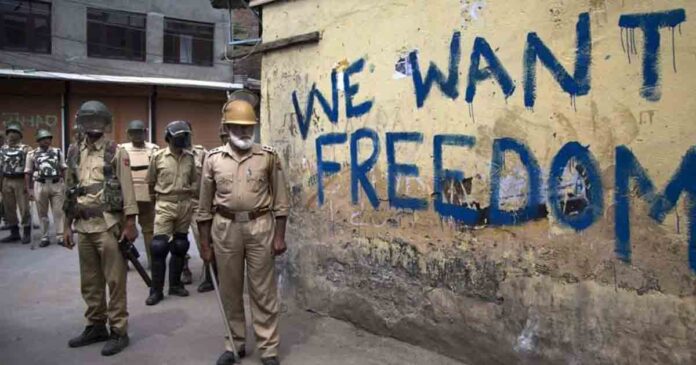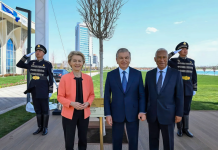By Kamran A. Behbudov
The history of the Kashmir struggle untouched by Indian biasedness unfolds the sufferings of Kashmiris and their utmost toil to liberate the beautiful land of Kashmir as well as innocent Muslims from the brutality and barbarism of Indian troops. This biography of the Kashmir struggle which is written with the blood of harmless and upstanding Muslims fighting for the right cause marked the 27th of October as black day, a day of grief that is observed worldwide as on this day the Indian troops entered into the territory of Jammu and Kashmir without any legal order. In this way, the Machiavellian ideology of India took control over Kashmir and so the days of India’s limitless tyranny started back on this day in 1947.
The cruelty towards Kashmiris at the hands of the Indian government didn’t cease there as the New Delhi act revoked the special legal status of Indian Occupied Kashmir in the year 2019 dated August 5th under Articles 370 and 35A, which were part of the Indian Constitution. This revocation of articles was solely disobedience to not only International law charted under the United Nations but also to the Simla peace treaty that stated that no state has the power to make amendments to the legal status of Kashmir.
In this way, the far-rightest Hindutva-dominated ideology of Hindus not only politicized the Kashmir dispute, but also sowed the seed to bring about demographic changes to Kashmir. Under article 35A, only Kashmiris are granted citizenship and this legal article ruled out citizenship to non-Kashmiri. However, in the post-revocation of this article, now the non-Kashmiris are permitted to buy and sell land in Kashmir. Thus large numbers of domiciles issued to non-Kashmiris depict the same demographic changes which changed Palestine from Muslim dominated state to Jews dominated territory.
The story of how Kashmir became a region of confrontation dates back to the Independence of the Subcontinent from the British Raj and the division of the Subcontinent into Muslim and Hindu-dominated countries. Religion played a pertinent role in this reshaping of the map as this demarcation was done under one rule applied for all that where the Muslims are in majority they are free to form a government with the land of Muslims, Pakistan and Hindu-dominated areas can become part of greater Hindustan India. However, the Hindu Maharaja of Kashmir with a predominantly Muslim population turned a deaf ear to this rule of division. Hence, on this darkest day of the history of justice, Kashmir became part of India against the will of Kashmiris through an illegal agreement, and side by side India landed its first brutal troop of forces in the valley of Kashmir as a symbol of its dominance and power display. It was the very day when the brutal killing of Kashmiri started.
To this day, Indian forces illegally control the grounds of Indian Occupied Kashmir, and all the World and International organizations have turned blind eye to all the barbarism and cruelty done by Indian forces on Kashmiris. These Indian forces have orphaned millions of children, ripped apart the dignity of many helpless Kashmiri women, and brainwashed a large number of youth against their people through torture and persecution. These innocent souls have not watched a single beautiful sunset full of freedom since the Indians set foot in the land of Kashmir. Therefore, Kashmiris and all Muslims as well as those people who stand united against the Indian aggression on the Kashmiris celebrate 27th October as Black Day globally.
Understanding the role of the International community in this regard, the Security Council of the United Nations provided a resolution to the Kashmir problem, that the Kashmir issue can be resolved through a fair plebiscite carried out under the monitoring and supervision of the United Nations. The plebiscite will facilitate and empower the Kashmiris to utilize their right of self-determination and to join either of two countries, India or Pakistan. The United Nations Military Observer Group also took the responsibility to maintain a truce along the line separating the Liberated Azad Kashmir from Indian Held Kashmir. All of these points were agreed upon between both India and Pakistan but corresponding to this, India showed resilient behavior in the face of this treaty and blocked all the plans of the United Nations to set up a plebiscite in Jammu And Kashmir State.
Eventually, India’s defiance towards the United Nations resolution for the Kashmir dispute resulted in not India’s occupation of Kashmir but India’s invasion of Indian-occupied Kashmir. Kashmir is an integral part of Pakistan’s national interest and always has been an important lens within Pakistan’s top foreign policy agenda. Now is the right time to realize that resolution of the Kashmir dispute is an important impediment concerning regional stability and peace. If such territorial disputes are solved under the framework of the United Nations Security Council plan then the region of South Asia as a whole can prosper together to new heights and can become like the region of the Northern hemisphere. All of India is required to remove its troops from Kashmiri land and to facilitate Pakistan and the UN in organizing a fair plebiscite. Without removal of Indian troops from Kashmiri grounds and a cease to Indians using Kashmiri as human shields, neither fair elections can be conducted nor can Pakistan work with Indians on the same page.
Pakistan along with many other freedom-loving countries has upheld its support towards Kashmiri’s right to self-determination diplomatically, politically, and morally.
Azerbaijan is one of the strong supporter of Pakistan on Kashmir conflict. Azerbaijan is member of OIC contact group along with Niger, Saudi Arabia and Turkiye. Government and people of Azerbaijan reaffirms their support for the cause many times and demanded the solution of the conflict as per Security Council resolutions. “Azerbaijan supports the peaceful resolution of the Jammu and Kashmir issue according to the norms and principles of international law and the relevant UN Security Council resolutions,”
Moreover, Pakistan is also open to accepting proposals from mediators or third parties to resolve the dispute through back-channel diplomacy of track three diplomacy or multi-channel diplomacy. In order to put an end to the sufferings of Kashmiris, Pakistan is ready to join India for bilateral table talks and to conclude to agreed solution between the two as per wishes of Kashmiris, but India is still reluctant to accept these offers as it is engulfed in its far-rightest Hindutva extremist ideology, which is turning India into secular state and Kashmir main target to exert their influence of power.






